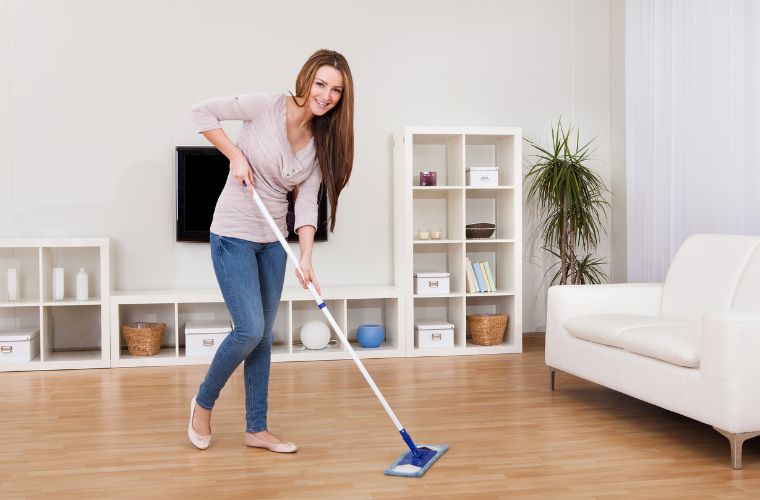8 Surprising Health Benefits of Spring Cleaning

Spring has officially sprung, and an annual tradition adapted to a more modern world happens at this time every year. Spring cleaning dates back to when people heated their homes by burning wood and coal, and the end of winter meant scrubbing surfaces caked with soot and dirt. The tradition looks very different for most today, but it is still a time to start fresh by purging old clothes, donating unused or unwanted items, shredding junk mail, cleaning your gutters and even doing a digital cleanse by emptying out your dreaded inbox, deleting unused apps or getting rid of old photos on your devices.
“Organizing our lives, be it the homes we live in, the food we eat, and the relationships we need to maintain, all make a difference in how we deal with the life stressors that we all face,” said Dr. Harold Levine, DO, CMO, and BayCare’s director and chief medical officer of behavioral health.
The American Psychiatric Association estimates that 5% of the U.S. population experiences seasonal affective disorder (SAD), a type of depression that affects mood and behavior when the seasons change. It is characterized by symptoms such as increased sadness, changes in sleep and appetite, and a loss of energy. For those individuals, Spring cleaning can be a tangible way to mark the shift in seasons and bring a sense of relief.
Let’s look at the connection between cleaning and your physical and mental health, and some of the benefits.
- Burn calories. Whether you’re wiping down your baseboards, dusting the blinds, vacuuming, rearranging furniture or giving the grout between your bathroom tiles a deep clean, you’re getting in a workout. While age, weight and gender play a role, on average, a 150-lb. person can burn between 100 and 300 calories per hour during a cleaning session depending on the type of activity and vigor with which you do it.
- Reduce stress. Having a sense of control over your environment and space can have a significant impact on your health, including your mental health. Clutter can lead to decreased focus, confusion and tension, while an organized home tends to produce more positive emotions like calmness and clarity.
- Boost your immune system. Powerful asthma triggers, such as dust and pet dander, float on small air currents and settle on surfaces in your home. A thorough cleaning of your home can help eliminate allergens and keep new ones from coming into your home.
- Improve sleep. Do you feel like you can’t fall asleep, and your mind is racing at night? Our brain interprets visual stimuli as tasks that need to be completed. Clutter in our homes and bedrooms can prevent our body’s cortisol levels from naturally declining throughout the day. Cortisol levels are lower in the evening to help us maintain healthy sleep patterns, but if we’re surrounded by clutter, it disrupts our sleep cycle. As a result, we’re not able to fall asleep as easily or have the deep sleep we need to rejuvenate.
- Regulate your mood. The act of cleaning requires us to slow down, offering a calming effect during overwhelming situations and helps us to manage and control our emotions. Start small by tidying up a junk drawer or setting a timer for 15 minutes to organize one space. Tackling smaller tasks can quickly translate to having the motivation to move on to larger spaces.
- Have more energy. The more things we have, the more things we must clean, organize and manage. It can be frustrating and time-consuming when you know what you’re looking for but can’t put your hands on it. Purging some unwanted items you don’t use anymore creates more space and breathing room, allowing you to focus on more important things.
- Gain control of your environment. When you feel like your life is out of control or you’re struggling with uncertainties, cleaning can be a positive way to assert some control in your life. So, if you’re feeling an urge to clean and declutter when you’re stressed, your mind and body may be looking for a way to bring more order to your spaces.
- Make connections. Enlist help from a family member (and yes, your kids can help, too!), friend or professional to tackle cleaning sessions. Working together to complete a task, big or small, can create a sense of accomplishment. Additionally, when your home is free of clutter, you will feel more comfortable welcoming visitors.
Dr. Levine added, “Individually these are not solutions. Collectively they can make a difference in the way we function.”
The psychological benefits of Spring cleaning extend beyond the immediate satisfaction of a tidier space, to organizing your mental space to find peace and harmony in your daily life. Don’t think of it as a daunting task that will take weeks, or even months, to fully complete. Start small and celebrate progress on your way to a clear, organized and tranquil living space and improved mental health.
If you’re feeling unmotivated to complete everyday tasks or are suffering from depression and/or anxiety, BayCare offers a variety of behavioral health services so you can speak to a professional and seek help.
